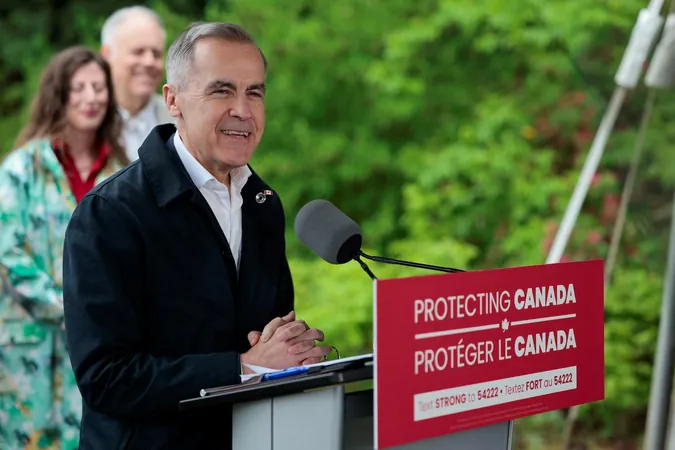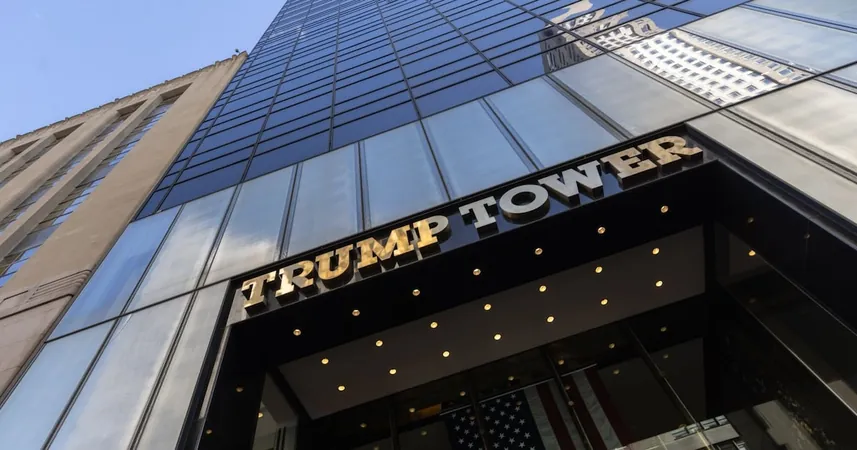
Mark Carney's Carbon Rebate: A Strategic Move Before Middle-Class Tax Cuts
2025-04-08
Author: Amelia
Introduction
Liberal Leader Mark Carney is defending the federal government's strategic decision to issue advance cheques to Canadians as compensation for a carbon levy, which has recently been eliminated. Carney asserts that this move is designed to act as a bridge to his proposed middle-class tax cuts, set to rollout after the April 28 election.
Canada Carbon Rebate Program
The government is set to distribute approximately $4 billion under the Canada Carbon Rebate program to around 13 million Canadians. This rebate will only be given to those who have filed their tax returns by April 2. The remaining Canadians will receive their rebates after their 2024 tax assessment, as stipulated by the Canada Revenue Agency.
Officially termed a "rebate," these cheques are essentially advance payments aimed at offsetting costs that households would have incurred due to the carbon levy. April marks the last round of these payments, as the government eliminated the consumer fuel charge on April 1.
Proposed Tax Cuts
Carney's campaign kick-off included an announcement of a proposed tax cut for middle-class families, potentially saving two-income households up to $825 annually by reducing the marginal rate on the lowest tax bracket by one percentage point. According to Liberal estimates, this tax cut is expected to directly benefit more than 22 million Canadians, with a significant positive impact on middle- and low-income families.
Carney's Clarification
While the initial announcement of tax cuts did not explicitly mention the carbon rebate as a temporary measure, Carney clarified his intentions, highlighting that it serves the purpose of bridging financial relief to Canadian families until the tax cuts can be implemented.
"This rebate ensures that families will come out ahead. It's entirely consistent with my commitments when I announced my leadership campaign. It’s the right approach, and that’s why we moved forward with it," Carney stated during a campaign event in Victoria.
Reactions and Criticism
In eight provinces participating in the scheme, the carbon rebate is being issued to families and individuals to compensate for the now-nonexistent federal pollution pricing. His Conservative opponents have criticized this levy, dubbing it a tax that should be abolished; however, Carney argues that abolishing it without substitutes could financially harm a majority of Canadians since the Canada Carbon Rebate offsets the costs for approximately 70% of households.
Notably, the British Columbia government, which previously managed its own carbon levy, has also decreased its charge to zero, mirroring the federal government's actions.
Carbon Rebate Amounts
The amount of the carbon rebate varies based on household size and location. For instance, a family of four could receive between $220 in Nova Scotia and Prince Edward Island and as much as $456 in Alberta. Importantly, residents outside of Quebec, B.C., and the territories qualify for this rebate.
Conservative Response
On the opposing side, the Conservatives have also promised tax reductions for middle-income earners and the elimination of the entire carbon pricing system, including the levy affecting industries. Campaign spokesperson Katy Merrifield has expressed concerns that the Liberals intend to maintain carbon pricing on industries, which could subsequently raise costs for Canadians.
Critics accuse Carney of likely replacing consumer carbon charges with a new set of industrial taxes, which they argue would ultimately be passed on to consumers. During the Liberal leadership race, Carney had pledged to impose a new charge on industrial emitters, in addition to existing carbon pricing, to finance green initiatives.
"One final cheque before the election won’t counterbalance the significant new carbon tax he has vowed to impose, which is expected to inflate costs across the board," Merrifield argued.
Conclusion
With the election approaching quickly, the stakes are high as Canadians weigh the implications of these policies. Will Carney’s carbon rebate effectively support his planned tax cuts? Stay tuned as the political landscape unfolds!









 Brasil (PT)
Brasil (PT)
 Canada (EN)
Canada (EN)
 Chile (ES)
Chile (ES)
 Česko (CS)
Česko (CS)
 대한민국 (KO)
대한민국 (KO)
 España (ES)
España (ES)
 France (FR)
France (FR)
 Hong Kong (EN)
Hong Kong (EN)
 Italia (IT)
Italia (IT)
 日本 (JA)
日本 (JA)
 Magyarország (HU)
Magyarország (HU)
 Norge (NO)
Norge (NO)
 Polska (PL)
Polska (PL)
 Schweiz (DE)
Schweiz (DE)
 Singapore (EN)
Singapore (EN)
 Sverige (SV)
Sverige (SV)
 Suomi (FI)
Suomi (FI)
 Türkiye (TR)
Türkiye (TR)
 الإمارات العربية المتحدة (AR)
الإمارات العربية المتحدة (AR)